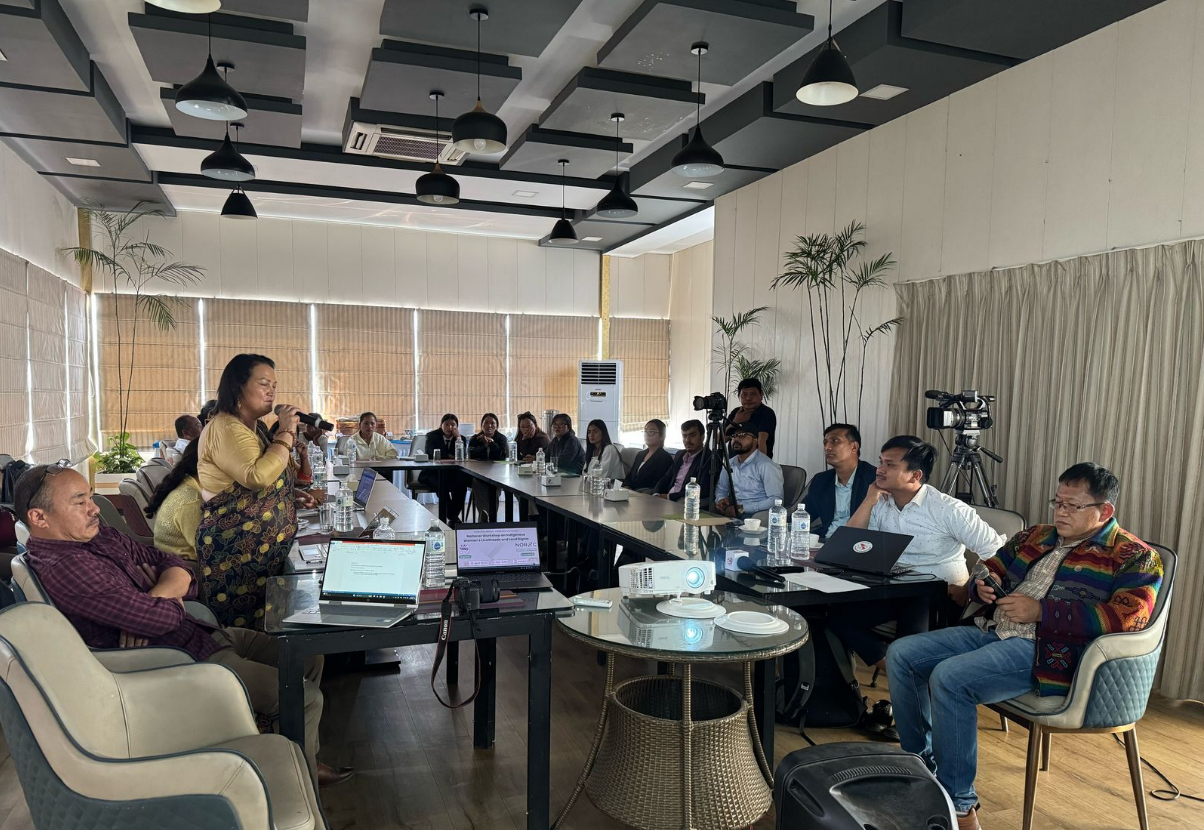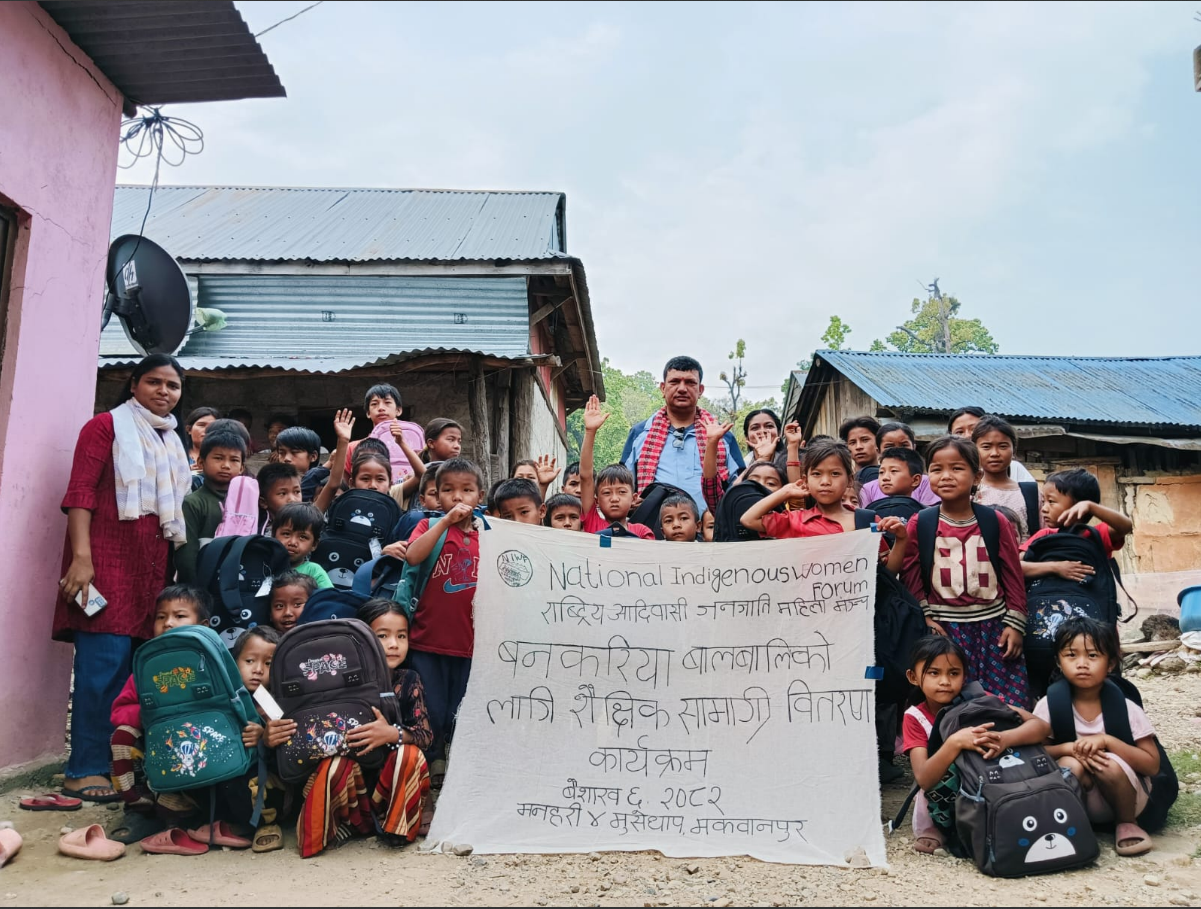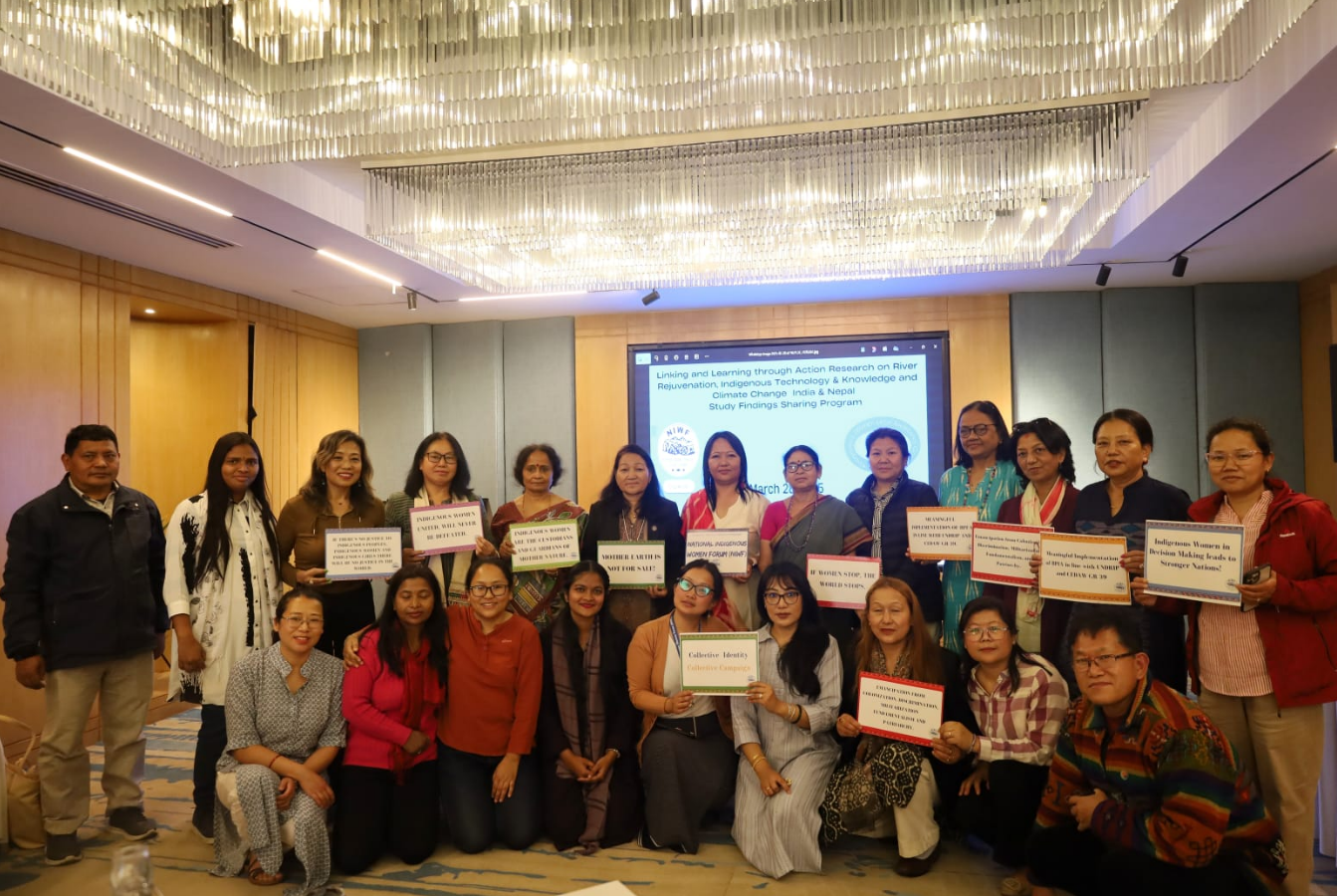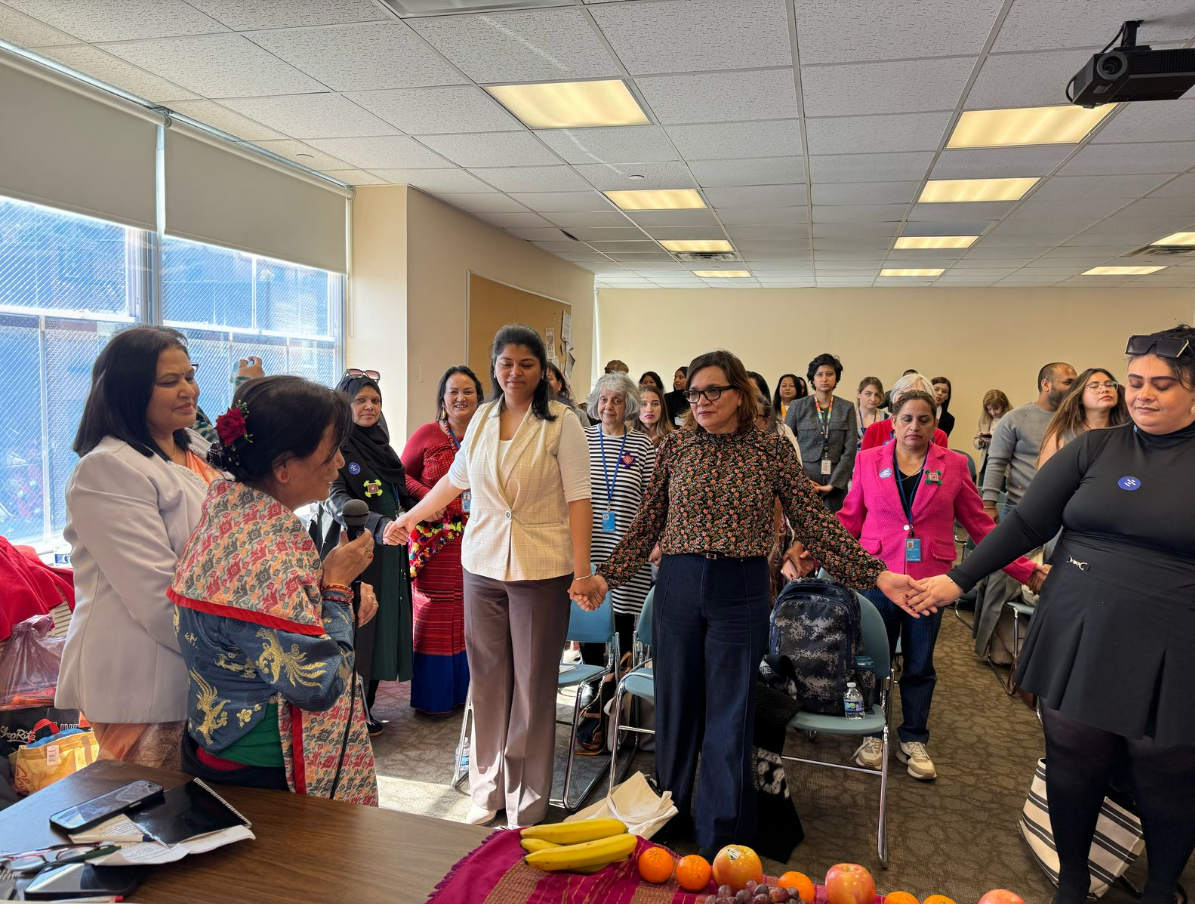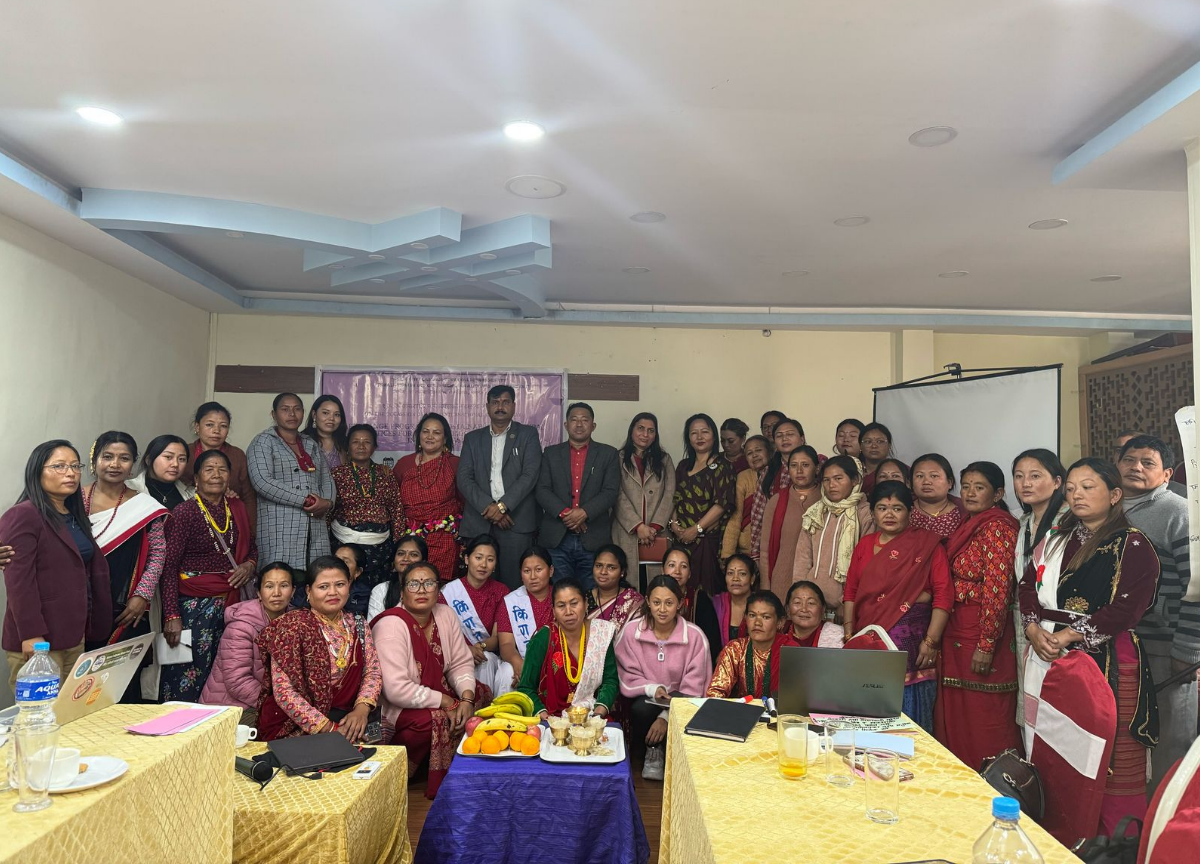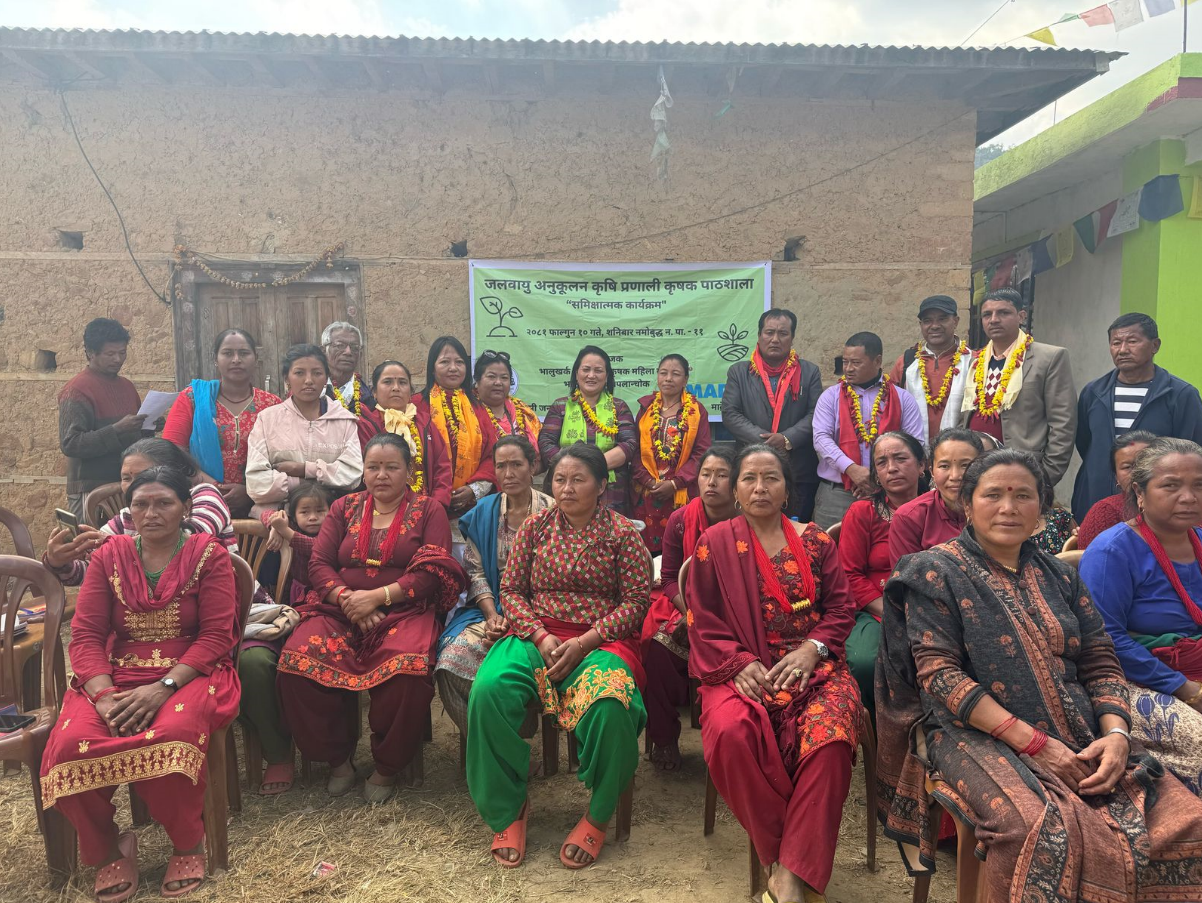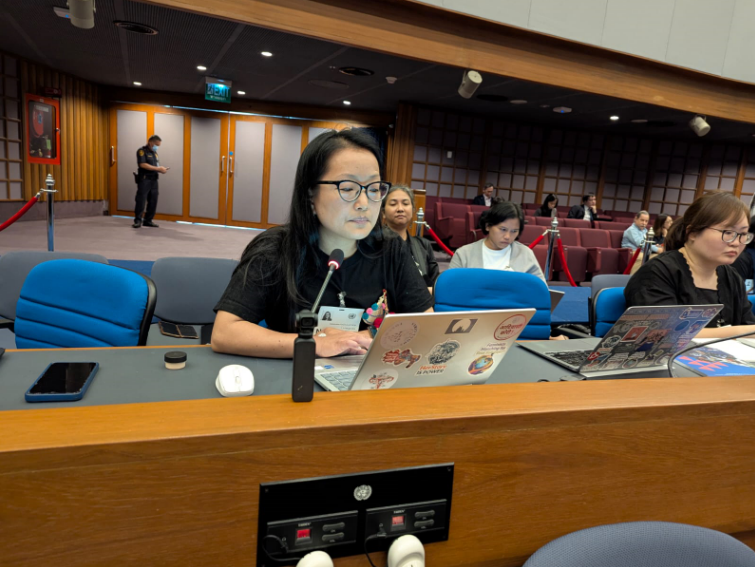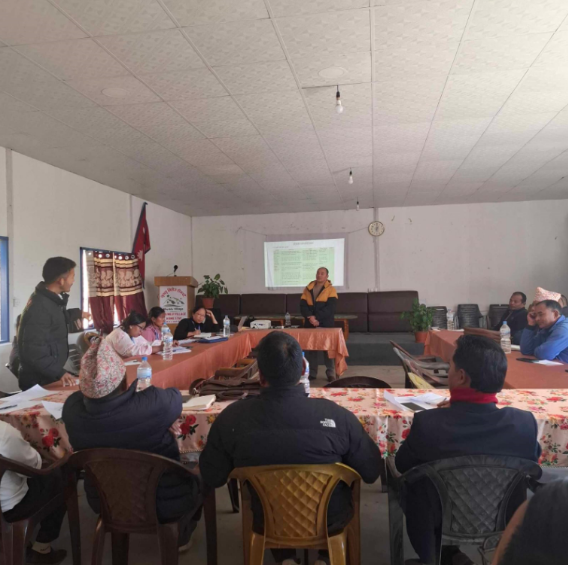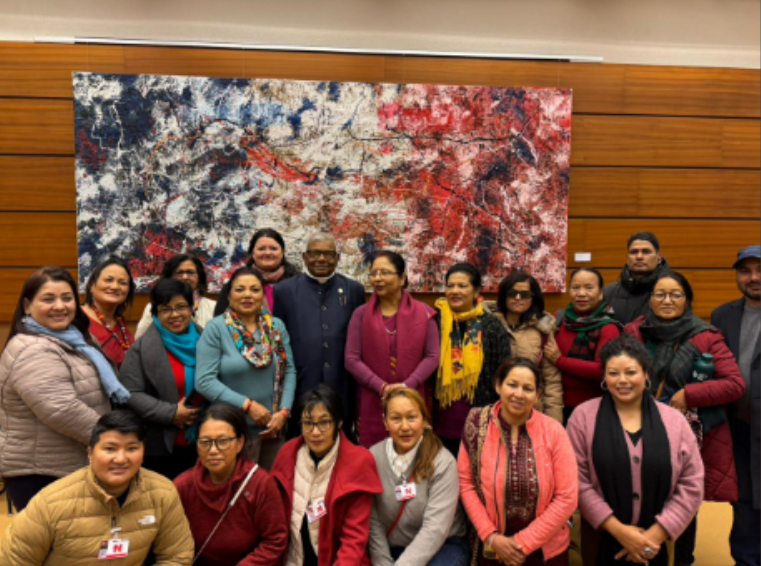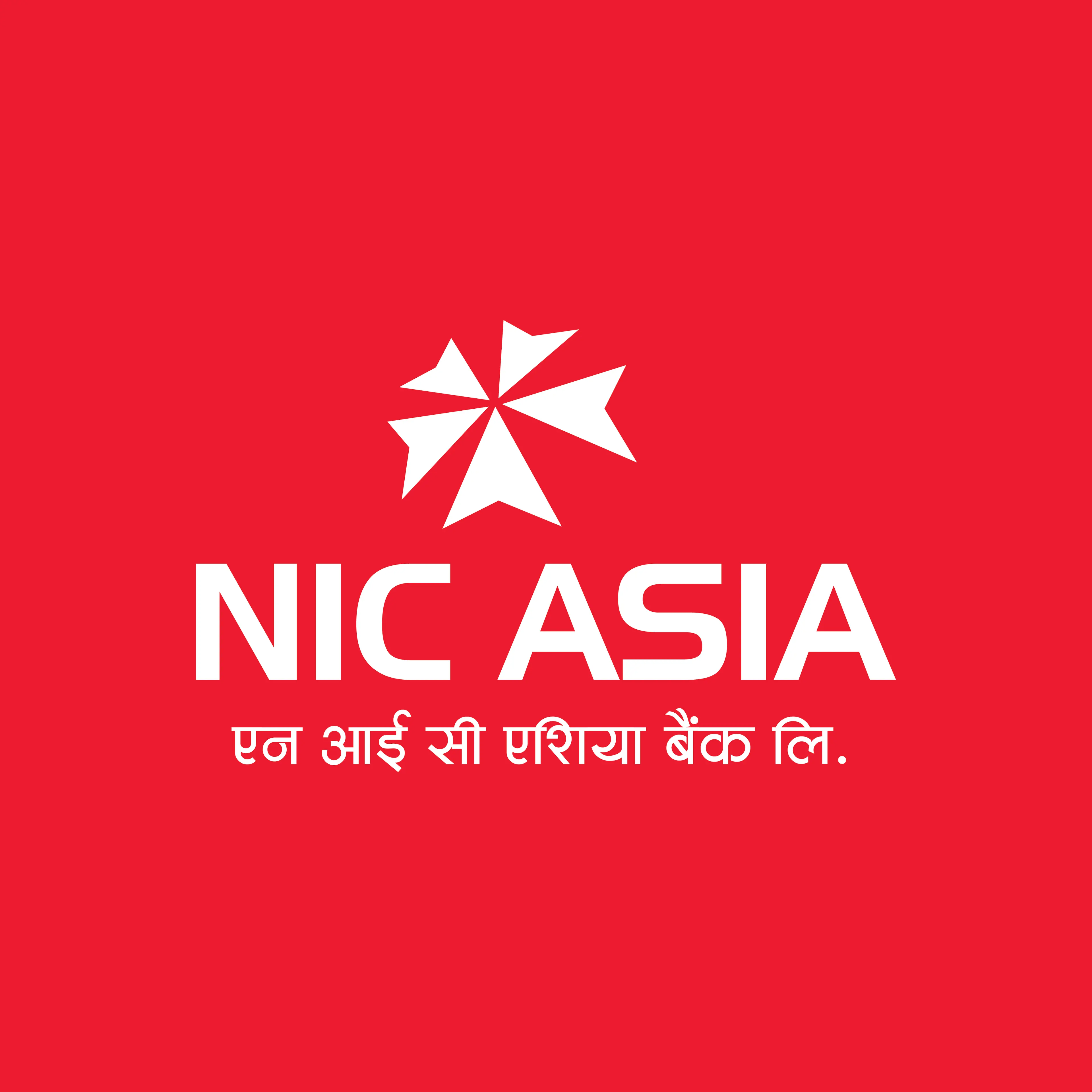
On April 22, 2025, National Indigenous Women Forum (NIWF), with the support of NOREC, organized a National Workshop on Indigenous Women's Livelihood and Land Rights. The event was facilitated by Mr. Kamal Kumar Rai, bringing together diverse voices to discuss the critical intersection of Indigenous Women's livelihoods, land rights, and policy. The workshop commenced with opening remarks by NIWF Chairperson Ms. Suni Lama, who welcomed all participants and provided an overview of the NOREC exchange program. She highlighted the objectives of the workshop and the importance of cross-country learning and solidarity among Indigenous Communities.
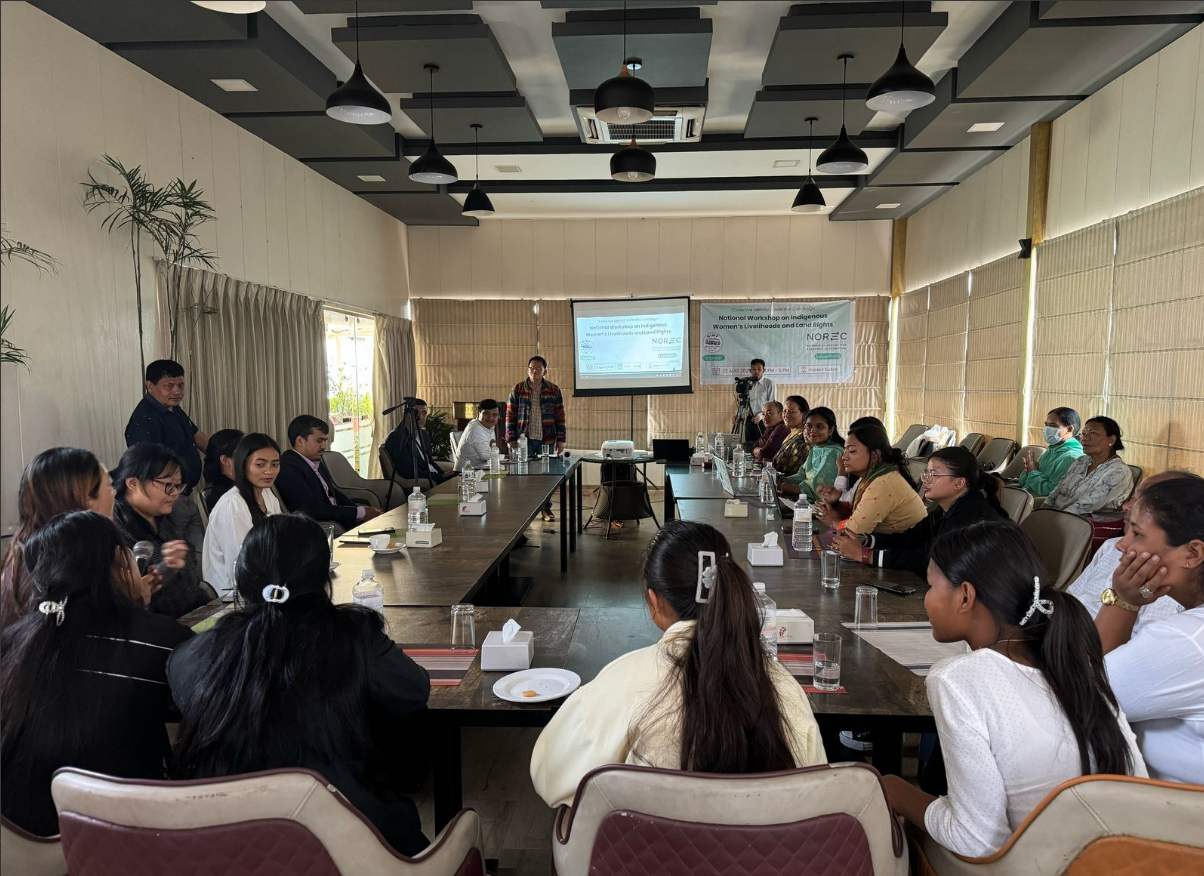
A presentation was delivered by NIWF’s exchange volunteers from Bangladesh, Ms. Afsana and Ms. Elizabeth, who shared insights into the work of Badabon Sangho, a grassroots women-led organization in Bangladesh. They discussed the current scenario of land rights in Bangladesh, including the challenges faced by Indigenous and marginalized Women in securing and protecting their lands. Following this, Mr. Kamal Kumar Rai gave a detailed presentation on the land rights situation in Nepal, focusing on existing national policies and their implications for Indigenous peoples. He emphasized the need for stronger policy implementation to ensure equitable land ownership. Mr. Rajendra Dhungana, Under Secretary at Ministry of Forests and Environment further expanded on the role of the government in addressing land rights, underlining gaps in current legal frameworks and the urgency for reform to ensure justice for Indigenous communities. Mr. Divas Rai, General Secretary of Nepal Federation of Indigenous Nationalities (NEFIN), shared stories of resistance and resilience from various Indigenous communities. He stressed the need for collective advocacy and unity in securing land rights and preserving Indigenous ways of life. From a media perspective, Mr. Fulman Bal, General Manager of Nepal Television, reflected on the influence of Western narratives and highlighted the vital role of media in amplifying Indigenous voices and protecting cultural identity.
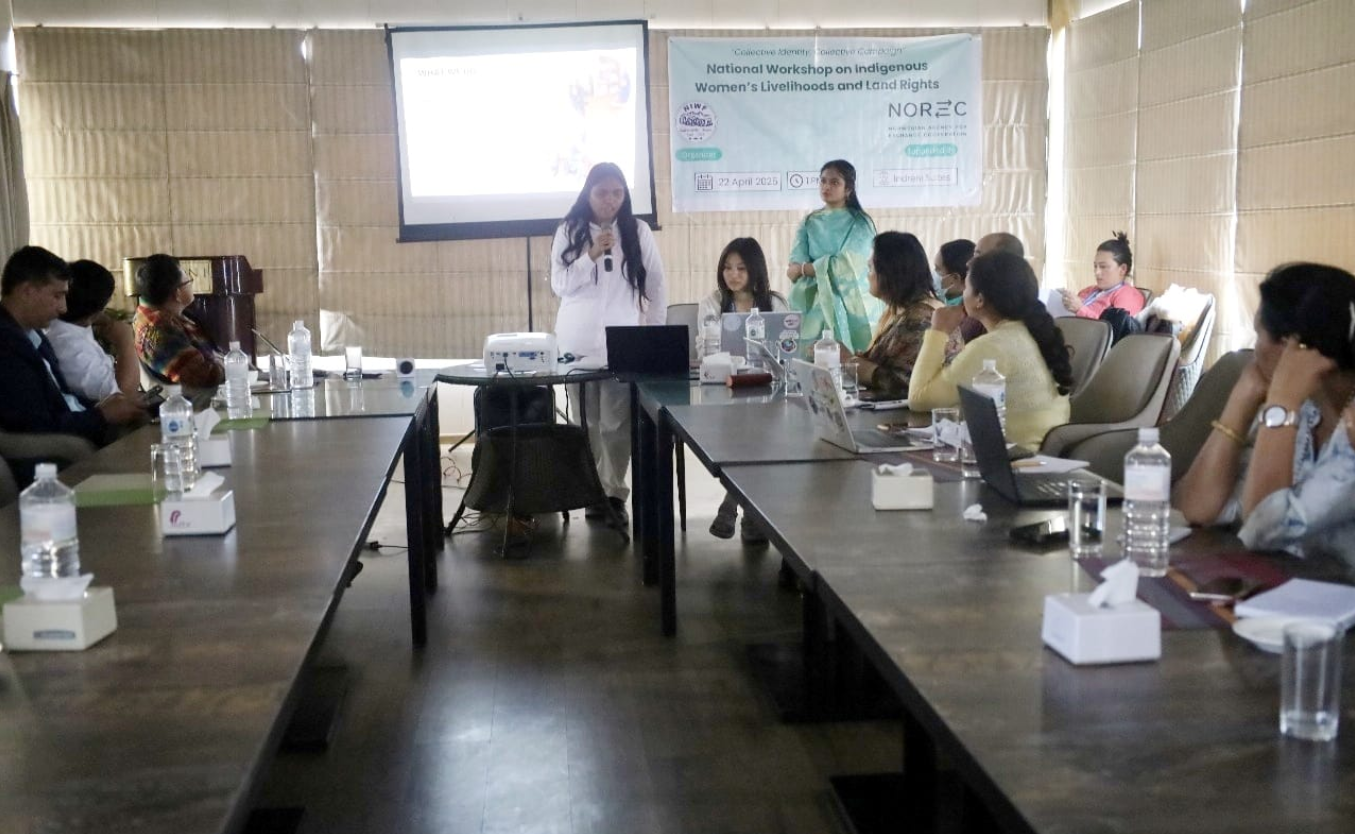
The program concluded with closing remarks by Ms. Suni Lama, who expressed her gratitude to all speakers and participants for their valuable contributions. She reaffirmed NIWF’s commitment to uplifting the lives of Indigenous women and girls, and advocating for their land rights, dignity, and sovereignty.
National Indigenous Women Forum (NIWF), with financial support from MADRE, organized a school supplies distribution program in Hadikhola, Manahari Rural Municipality Ward 4. A total of 49 children from Grades 1 to 8 received school uniforms, shoes, bags, and essential stationery items. Among the recipients were 22 children from the endangered Bankariya community, 25 from the Chepang community, and 4 from the Tamang community. The distribution was officially carried out by Ward Chairperson Mr. Prakash Thapa. In addition to these items, educational materials were also distributed to 51 children. These included 56 dozen notebooks, 15 packets of dot pens, 5 boxes of pencils, 15 boxes of sharpeners, 15 boxes of erasers, and 50 record files. The program is part of the Santoshi Project, which also supports the operation of tuition classes for one year. With MADRE’s financial assistance, the project aims to enhance the academic performance of children from marginalized Indigenous communities. Since 2015, Santoshi Bankariya has been conducting tuition classes for Bankariya and other Indigenous children in the area.
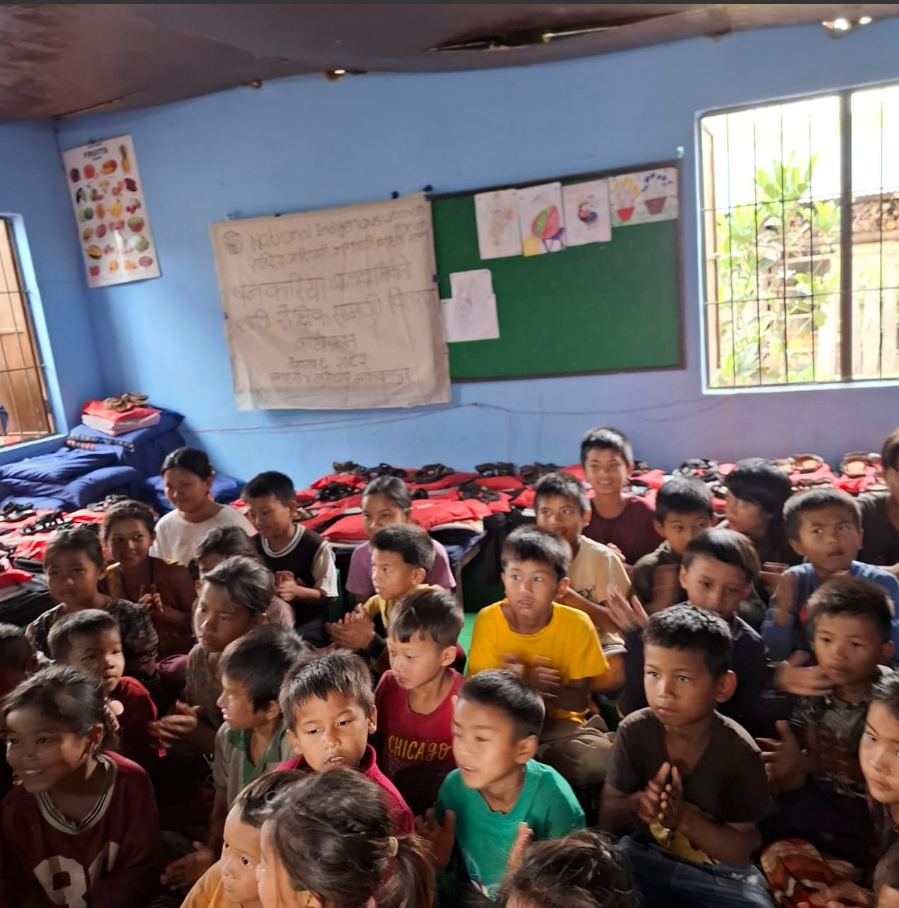
The event was organized by NIWF's Field Coordinator Ms. Sanila Lama, staff member Ms. Rukmini Shrestha, Bangladeshi volunteers Ms. Eliza Baske and Ms. Afsana Ani. Mr AshokSujan Shrestha from Federation of Nepalese Indigenous Journalists (FoNIJ) was also present in the program as guest and news coverer.

On March 28, 2025, National Indigenous Women Forum (NIWF) and Indigenous Women Legal Awareness Group (INWOLAG), in collaboration with Adivasi Samanta Manch (ASM), jointly organized a sharing program on the research findings of the 'Linking and Learning through Action Research on River Rejuvenation, Indigenous Technology and Knowledge, and Climate Change.' The event served as a platform for Indigenous leaders, researchers to engage in critical discussions on the role of Indigenous knowledge in fostering climate resilience and sustainable environmental practices. The program was facilitated by Ms. Arzoo Rana Thapa, Program Coordinator of INWOLAG, who guided the sessions and ensured a productive exchange of ideas among participants. The event commenced with welcome remarks from Ms. Kaushila Rai, General Secretary of INWOLAG, who underscored the significance of this research in amplifying Indigenous voices and reaffirming their leadership in environmental conservation. She acknowledged the collaborative efforts of NIWF, INWOLAG, and ASM in undertaking this research and emphasized the need for continued dialogue and action to address climate challenges affecting Indigenous communities.
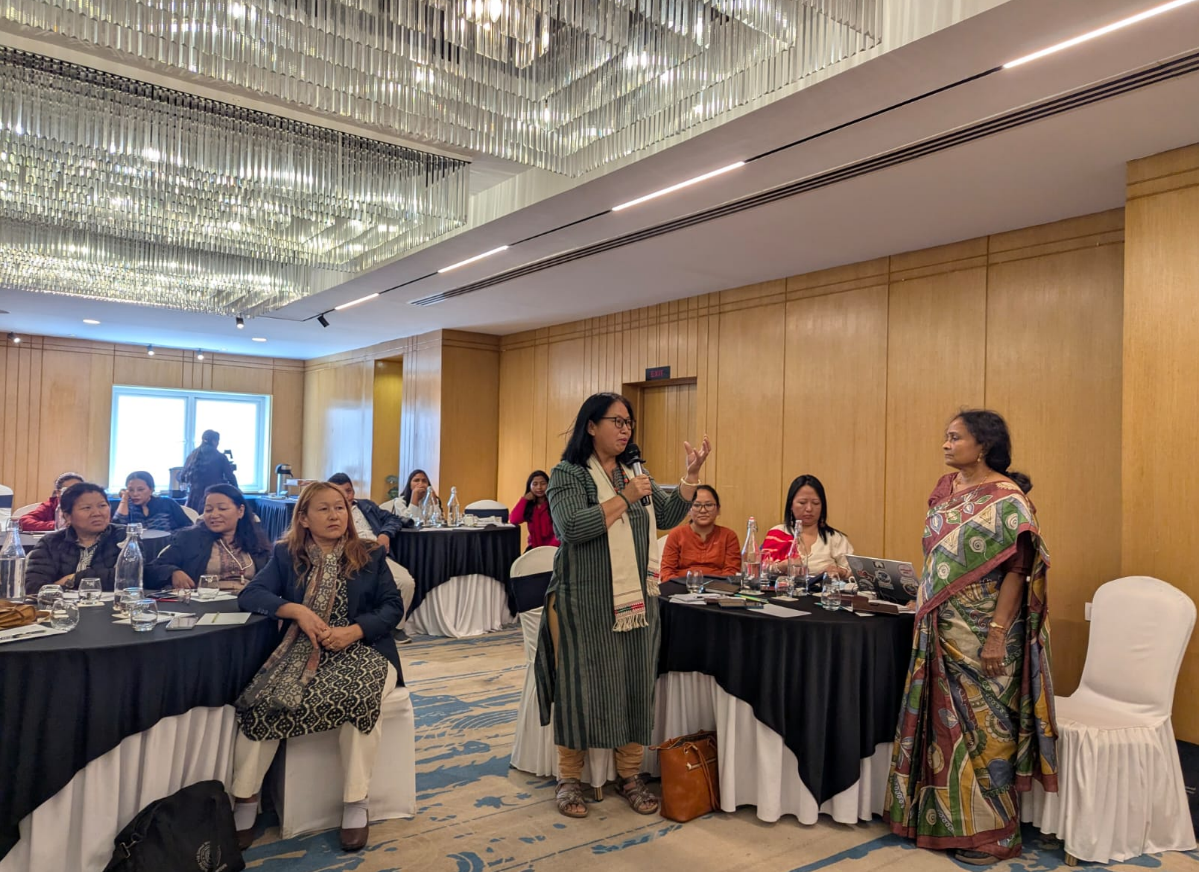
The highlight of the program was the presentation of key research findings by Ms. Bratindi Jena, Lead Researcher of the project. She provided an in-depth analysis of the study’s outcomes, showcasing how Indigenous communities have long been the custodians of traditional ecological knowledge, utilizing sustainable water management techniques and climate adaptation practices rooted in their cultural heritage. Ms. Jena detailed case studies that demonstrated Indigenous-led initiatives in river rejuvenation, emphasizing their effectiveness in restoring ecosystems and ensuring water security for local populations. She further elaborated on how Indigenous technology and practices can complement modern scientific approaches to address climate change.
Representing NIWF, Ms. Sushila Maya Gole, Treasurer of NIWF, addressed the gathering, highlighting the invaluable contributions of Indigenous Women in environmental stewardship. She stressed the urgent need to integrate Indigenous perspectives into national and international climate policies and called for greater recognition of Indigenous-led solutions in climate resilience efforts. Ms. Gole also shared insights on how NIWF has been working to empower Indigenous women and communities by documenting traditional knowledge and advocating for their inclusion in decision-making processes.
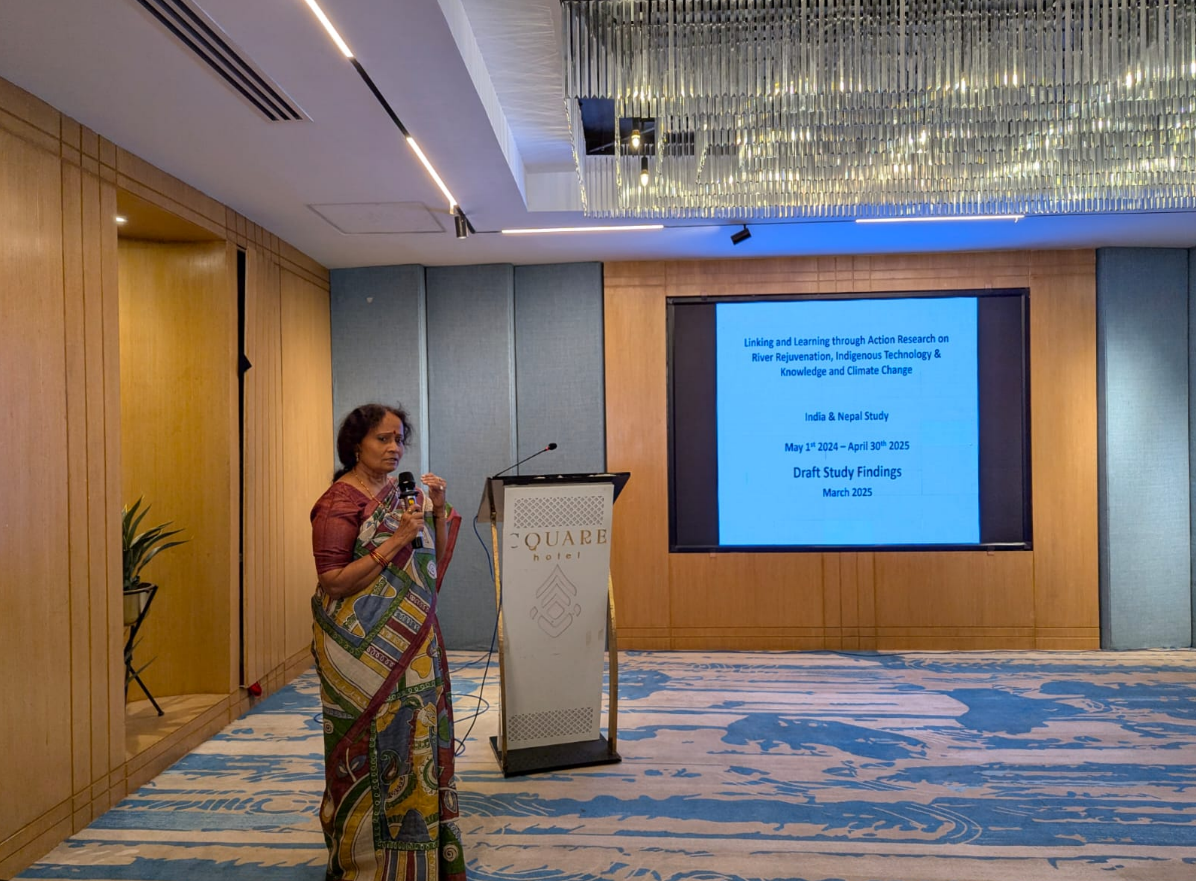
The discussion session allowed participants to share their reflections on the research findings and discuss actionable strategies for policy advocacy and community-driven initiatives. Many attendees emphasized the importance of protecting Indigenous knowledge systems from exploitation while ensuring that they receive due recognition and support. The conversations underscored the need for a holistic approach that combines Indigenous wisdom, scientific research, and policy interventions to tackle the pressing environmental challenges faced by Indigenous communities.
The program concluded with closing remarks from Ms. Indira Kumari Shreesh, Chairperson of INWOLAG, who reiterated the significance of collective action in preserving Indigenous wisdom and ecosystems. She expressed gratitude to all stakeholders involved in the research and emphasized the need for stronger partnerships to advance Indigenous rights and environmental sustainability. Ms. Shreesh called upon governmental and non-governmental organizations to support Indigenous-led conservation efforts and ensure that their voices are heard in climate governance frameworks.
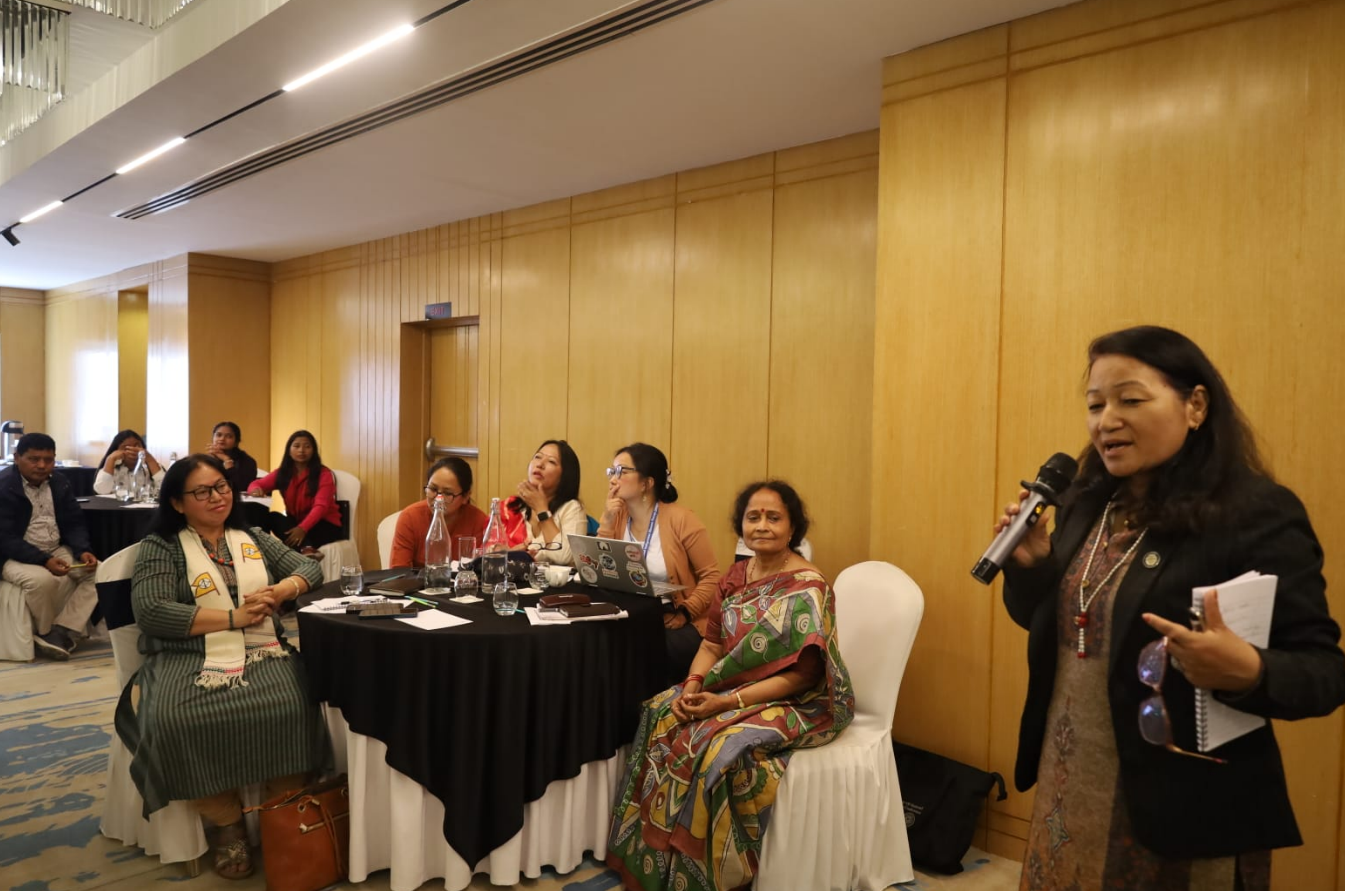
On March 19, 2025, National Indigenous Women Forum (NIWF), in collaboration with the Association for Dalit Women's Advancement of Nepal (ADWAN), hosted a parallel event at the 69th Commission on the Status of Women (CSW). Titled "Beijing +30 Review from Indigenous and Dalit Women's Perspectives," the event took place at the UN Church Center, 777 UN Plaza, 10th floor. This session provided a crucial platform for Indigenous and Dalit women’s rights advocates, policymakers, and international stakeholders to assess the progress, challenges, and gaps in implementing the Beijing Declaration and Platform for Action from an intersectional lens.
The distinguished panel featured prominent voices in gender equality and social justice, including Hon. Kiran Kumar Shah, Chairperson of the Women and Social Affairs Committee; Dr. Diana Fox, Professor of Anthropology and Chair at Bridgewater State University, USA; Patricia Cortes, Latin America and the Caribbean (LAC) Specialist at UN Women; Dr. Bishnu Maya Pariyar, Patron of ADWAN; and Yasso Kanti Bhattachan, Vice Chair of NIWF. Additionally, Pamela Morgan, Chair of NGO CSW, delivered a special address as the guest speaker.
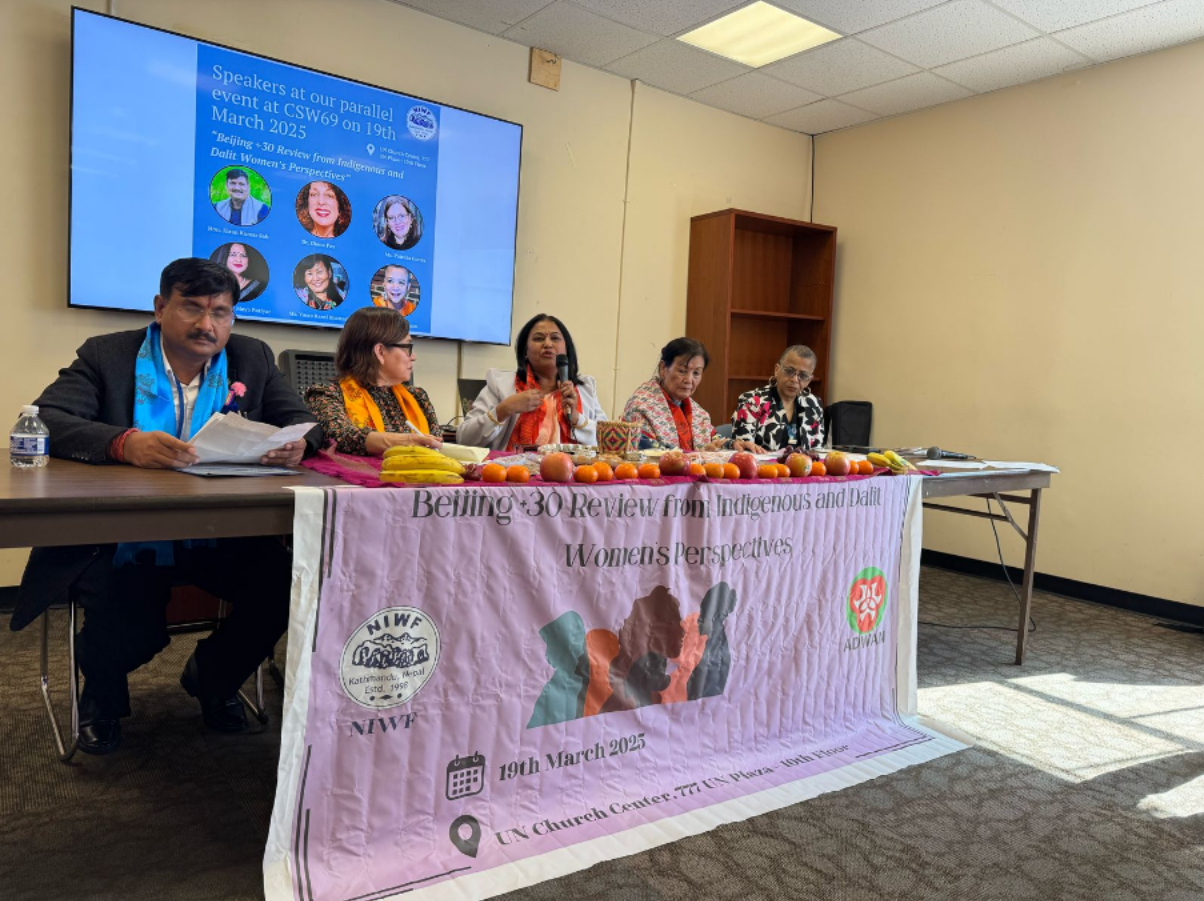
The event concluded with a strong call to action for governments, civil society organizations, and multilateral institutions to prioritize intersectional approaches in policy-making. Key recommendations included the inclusion of Indigenous and Dalit women in decision-making processes, strengthening grassroots-led initiatives, and amplifying their voices in international advocacy spaces. Through this dialogue, NIWF and ADWAN reaffirmed their commitment to advancing the rights of Indigenous and Dalit women, ensuring that their voices and perspectives are not only heard but also actively shape global gender equality agendas.
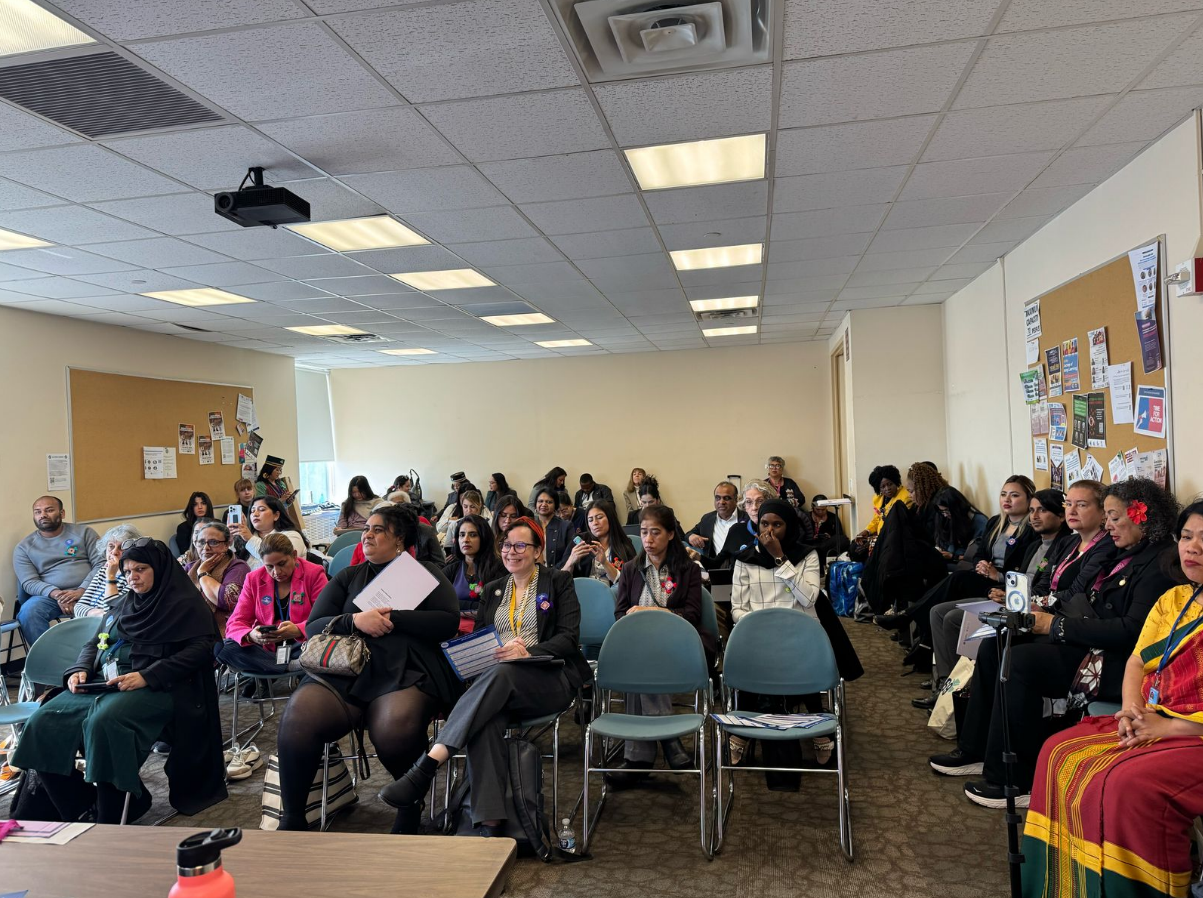
On March 8, 2025, in celebration of International Women's Day, the National Indigenous Women Forum (NIWF) organized an exchange program for members of the Integrated Pest Management (IPM) Group. The primary objective of the program was to create a meaningful space for participants to share their experiences, knowledge, and challenges as collective farmers. The event aimed to foster collaboration, enhance agricultural practices, and explore sustainable solutions to the difficulties faced by Indigenous women in farming. The session was facilitated by Ms. Ladipma Kirati, NIWF's Program Officer, and featured an engaging training session led by Ms. Huma Neupane. The training focused on various aspects of collective farming, including identifying key challenges, improving crop yields, and adopting sustainable farming techniques. Through group discussions, participants reflected on the barriers they encounter in agriculture, such as limited market access, climate change, and resource constraints. They also explored practical solutions and strategies to overcome these hurdles, strengthening their resilience as farmers. Additionally, the training provided valuable insights into market-oriented approaches, empowering participants with the knowledge and skills to effectively commercialize their vegetable produce. By the end of the session, attendees had a clearer understanding of how to enhance productivity, increase their income, and expand their reach in local and regional markets.
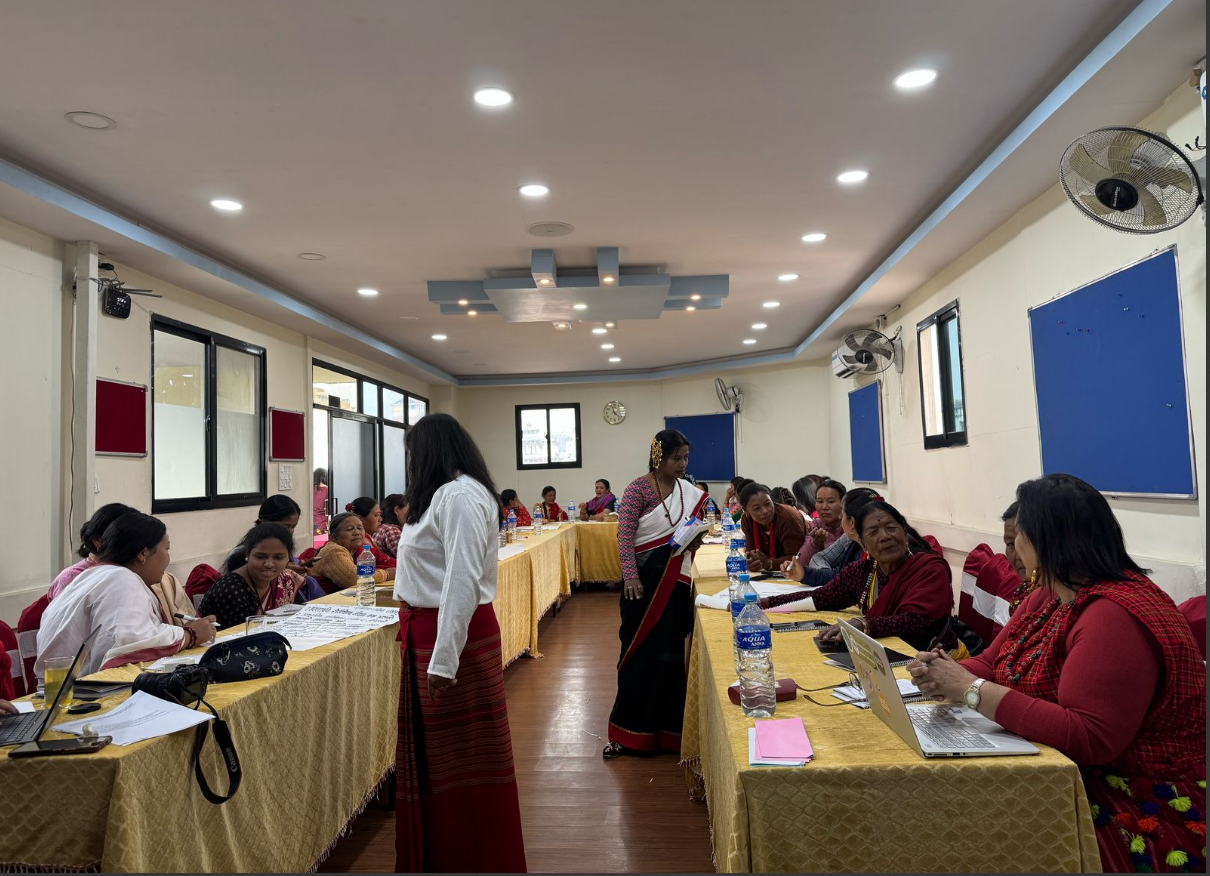
The second half of the program was honored by the presence of Hon. Kiran Kumar Shah of the Committee on Women and Social Affairs, who attended as the Chief Guest. This session was facilitated by Ms. Shanti Waiba. Ms. Suni Lama, Chairperson of NIWF, delivered an inspiring speech, extending her warm wishes to all attendees on the occasion of International Women's Day. She highlighted the persistent struggles faced by Indigenous communities, particularly Indigenous women. She emphasized the need for stronger representation, policy advocacy, and solidarity to ensure the protection and promotion of Indigenous rights. Following this, Ms. Sunita Rana Magar shared her reflections on the program, expressing her heartfelt gratitude to NIWF for organizing such an insightful and empowering event. She acknowledged the significance of creating spaces where Indigenous women can come together, exchange knowledge, and work collectively to build a more inclusive and equitable future. Hon. Kiran Kumar Shah also addressed the participants, recognizing the invaluable contributions of Indigenous women to agriculture, environmental sustainability, and community development. He expressed his solidarity with their efforts and underscored the need to stand together in the fight for equal rights and social justice. He further emphasized the importance of policy reforms, institutional support, and grassroots movements in ensuring that Indigenous women receive the recognition and opportunities they deserve.
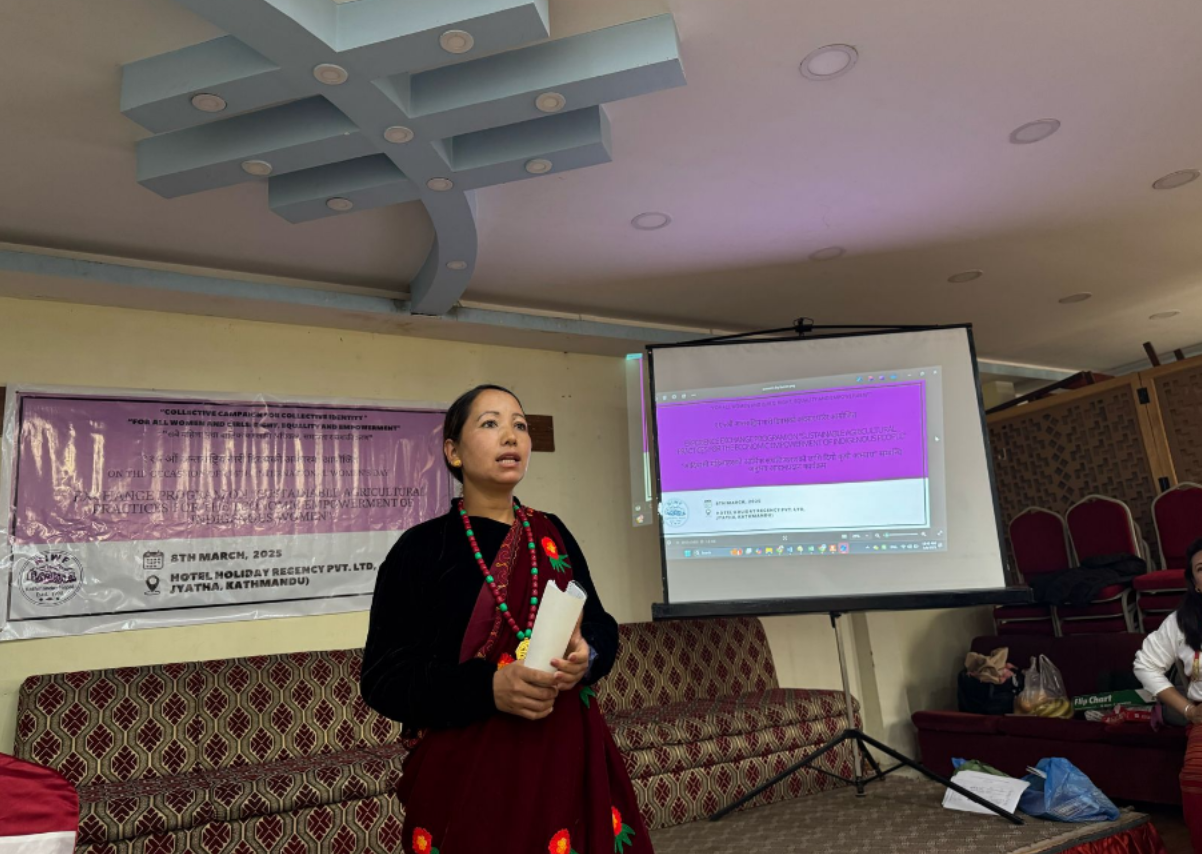
As part of the celebration, NIWF also took the opportunity to recognize and honor the winners of this year's Ms. Tamang competition, acknowledging their achievements in representing Indigenous culture and identity. The winners were presented with certificates of appreciation, which were handed over by the Director of Nepal Television, Mr. Fulman Bal. His presence added a special significance to the occasion, as he commended the contributions of Indigenous women in preserving cultural heritage and promoting diversity in Nepal’s media landscape.
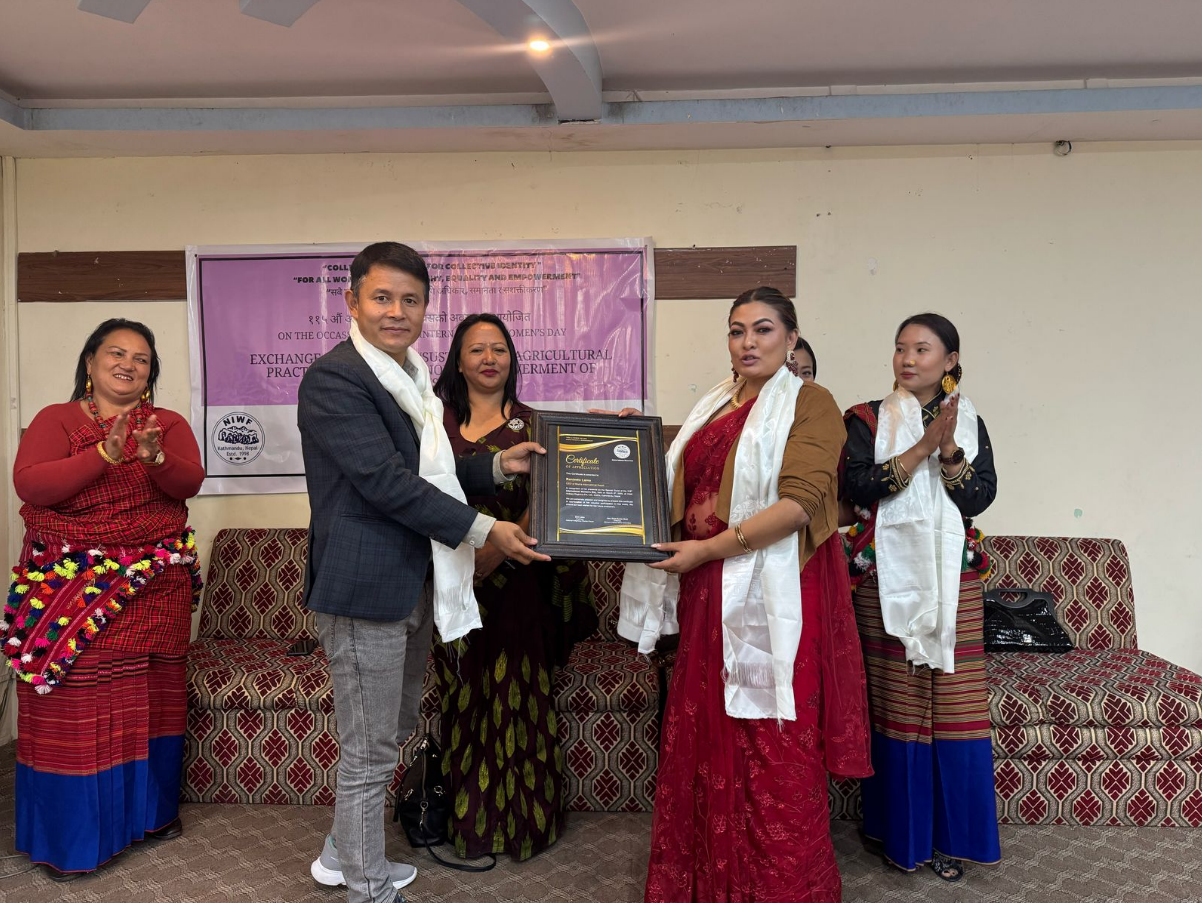
On February 22, 2025, the 10th-week review program of the Climate Adaptation Agricultural System was successfully conducted in Bhalukharka, Namobuddha Municipality, Ward 11, Kavre. This program, organized by the Bhalukharka Indigenous Women Farmers Group, aimed to assess the progress made by the participants in adopting climate-adaptive farming techniques and to encourage further engagement in sustainable agricultural practices. A total of 40 participants, including local farmers and community members, attended the program, contributing to meaningful discussions and reflections on their experiences over the past ten weeks.
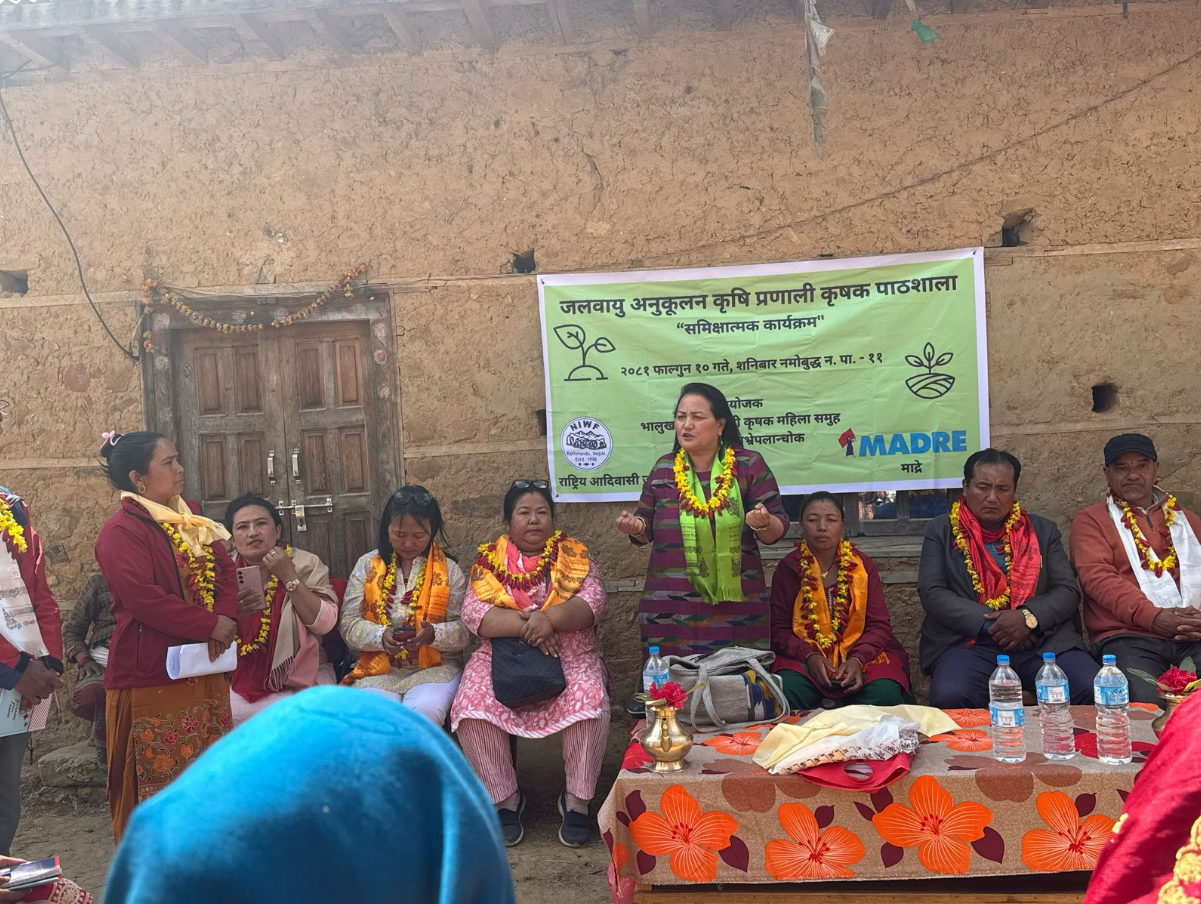
The event was graced by the presence of the chief guest, Mr. Krishna Bahadur Tamang, Ward Chairperson of Namobuddha Municipality, Ward 11. He acknowledged the efforts of the Indigenous women farmers and emphasized the significance of climate-resilient agricultural practices in ensuring food security and economic stability for rural communities. Additionally, Ms. Suni Lama, Chairperson of the National Indigenous Women Forum (NIWF), delivered a welcome speech, highlighting the crucial role of Indigenous women in sustainable agriculture. She stressed the importance of advancing their skills, knowledge, and farming systems to enhance their livelihoods and economic independence. She further encouraged them to take ownership of their agricultural initiatives and explore new opportunities for growth.
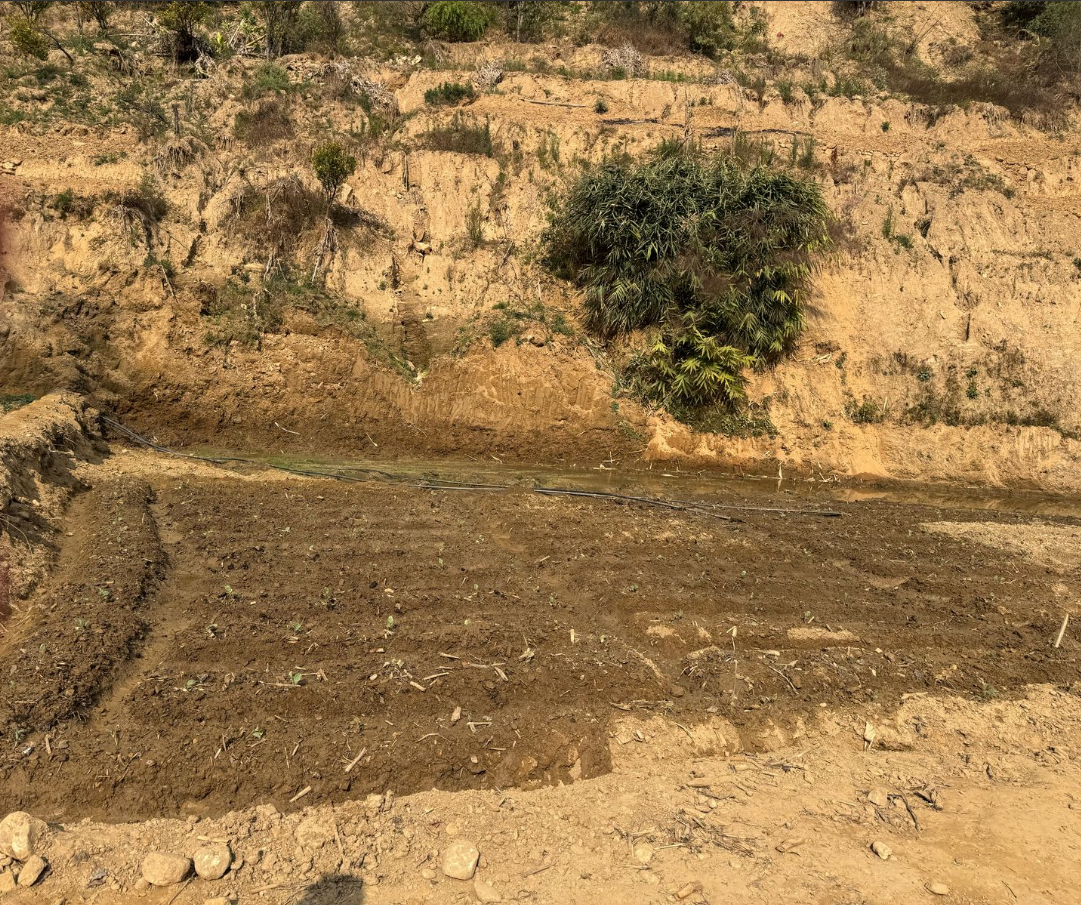
The primary objective of this initiative was to engage Indigenous women from rural areas in climate-adaptive farming systems, equipping them with the necessary knowledge, resources, and technical skills to build resilience against climate change. By empowering women farmers with climate-smart agricultural practices, the program aims to strengthen local food systems, promote economic self-sufficiency, and ensure long-term sustainability for Indigenous communities. The success of this review program marked an important milestone in fostering inclusive and sustainable agricultural development in the region.
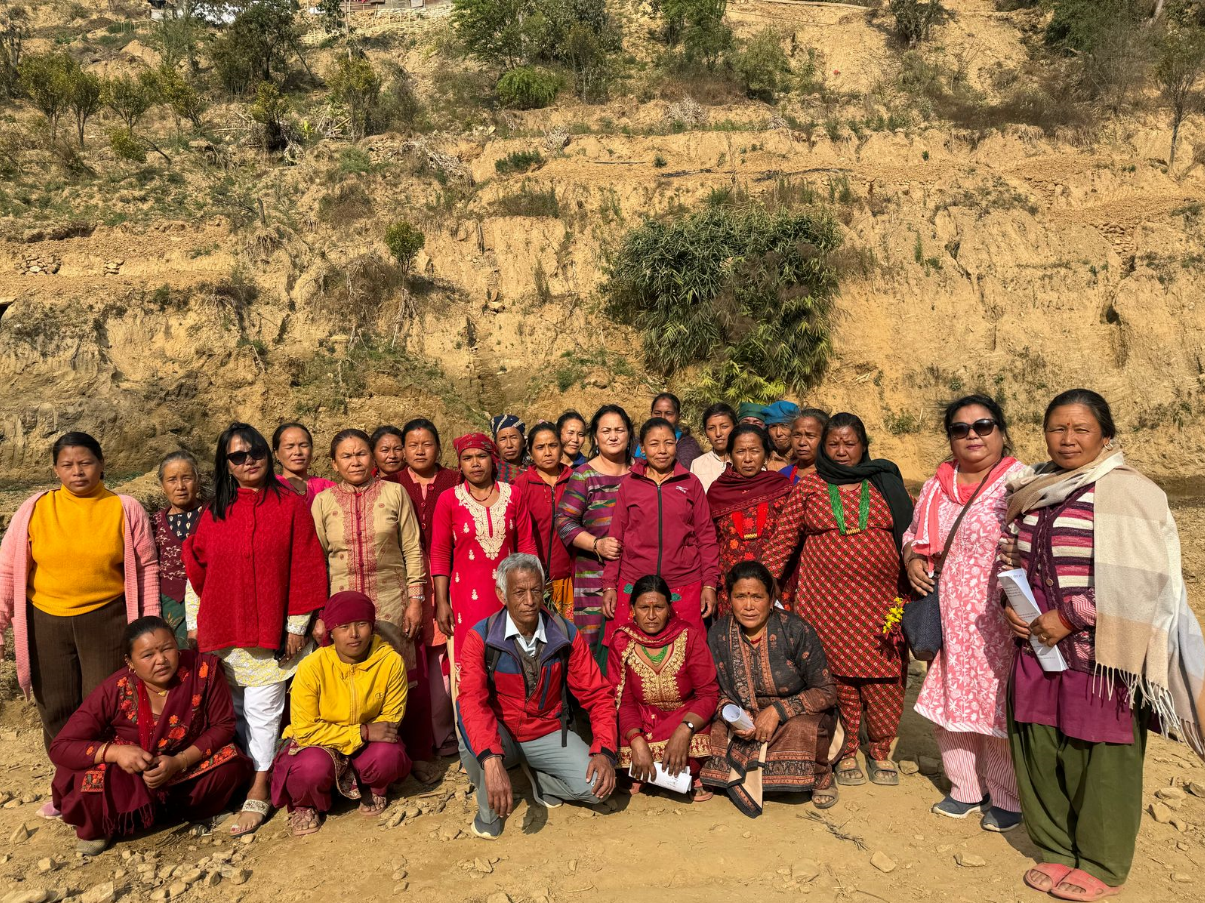
The Global Compact for Migration (GCM), adopted by the United Nations in December 2018, is the first intergovernmental agreement to comprehensively address all aspects of international migration. It provides a framework for safe, orderly, and regular migration while upholding national sovereignty. With 23 objectives, the GCM emphasizes human rights, border management, labor migration, and combating human trafficking. Though non-legally binding, it fosters international cooperation and shared responsibility among nations.
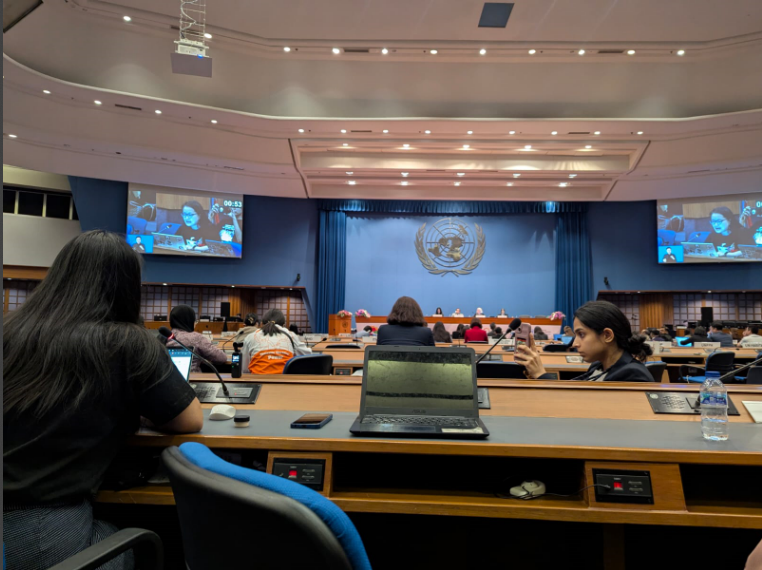
Despite global recognition of Indigenous knowledge in climate adaptation and the Sustainable Development Goals (SDGs), Indigenous perspectives remain largely absent from migration policies. Indigenous women migrants, in particular, face systemic discrimination at every stage—before departure, while abroad, and upon return. Achieving true climate justice requires migration policies that recognize Indigenous peoples as key rights-holders, ensuring their protection and meaningful participation in decision-making.
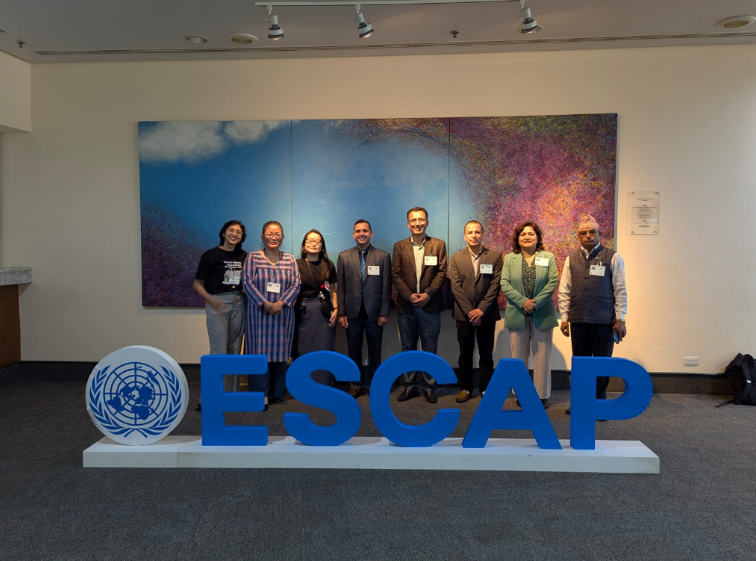
At the 2nd Asia-Pacific Regional Review of the GCM, hosted by ESCAP and the UN Regional Network on Migration for Asia and the Pacific, Ladipma Kirati, Program Officer at the National Indigenous Women Forum (NIWF), represented Indigenous women’s voices. She underscored the urgent need for migration policies that reflect Indigenous realities, advocating for a rights-based approach that safeguards Indigenous migrant workers from exploitation and exclusion. NIWF remains committed to ensuring that the struggles, voices, and demands of Indigenous migrant women are heard at the global level.
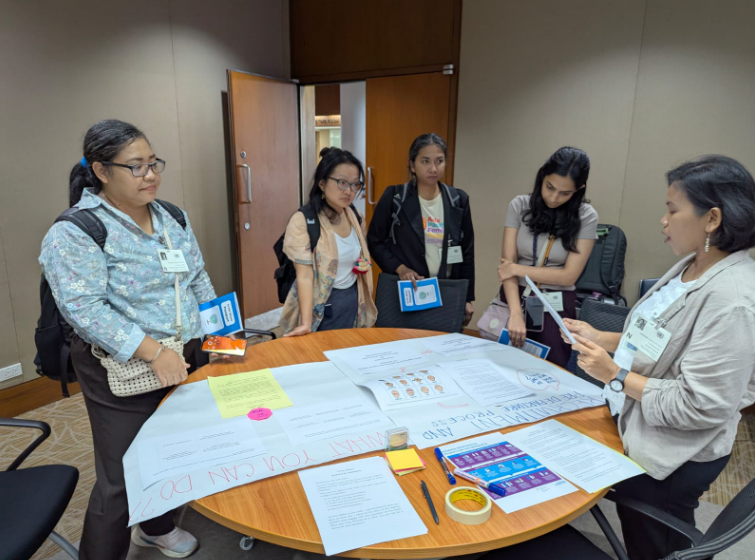
On February 6, 2025, National Indigenous Women Forum (NIWF) organized a discussion and interactive program titled "Indigenous Peoples and Indigenous Women in the National Adaptation Plan (NAP) 2021-2050 Review Report." The event took place in Ward No. 5 of Bhumlu Rural Municipality, Kavre district, and brought together key stakeholders to review the implementation of the NAP within the municipality, focusing on its impact on Indigenous Peoples — particularly Indigenous women. Mr. Hom Yamphu, a consultant at NIWF, delivered a comprehensive presentation outlining the NAP’s objectives, core strategies, and long-term implications. He highlighted how the plan seeks to build climate resilience by addressing the vulnerabilities of marginalized communities, while also stressing the need for stronger representation of Indigenous voices in both local and national adaptation processes.
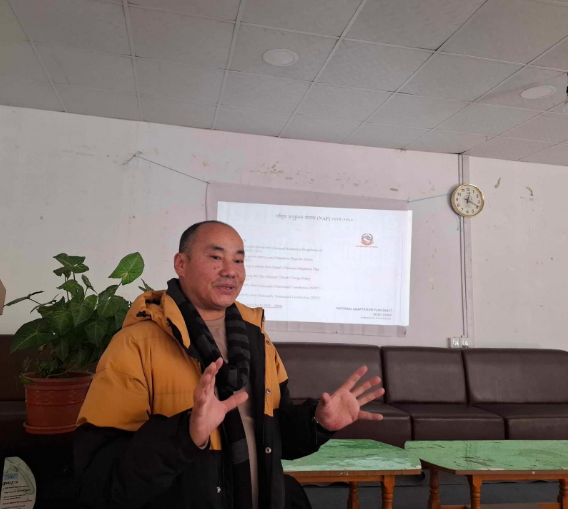
A total of 35 participants attended the event, including local government officials from Bhumlu Rural Municipality, Indigenous women leaders, community members, and climate activists. The discussions focused on identifying gaps in the NAP’s implementation, exploring how traditional knowledge systems can contribute to sustainable solutions, and advocating for inclusive policies that reflect the realities faced by Indigenous women. The event concluded with a collective call for action, urging local authorities to strengthen partnerships with Indigenous organizations like NIWF to create more effective, community-driven climate responses. The insights and recommendations gathered from this program will contribute to NIWF’s ongoing advocacy for Indigenous-inclusive climate policies at both the municipal and national levels.
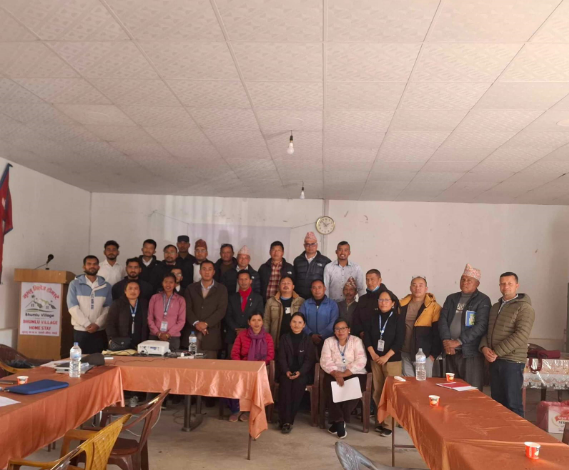
February 5, 2025 – Geneva: At the 90th session of the Convention on the Elimination of All Forms of Discrimination Against Women (CEDAW), the National Indigenous Women Forum (NIWF) actively advocated for the rights of Indigenous Women and Girls in Nepal. In collaboration with five other Indigenous Women-led organizations, NIWF has submitted a shadow report highlighting the systemic discrimination faced by Indigenous women. The report outlines key concerns, including discriminatory provisions in Nepal’s constitution, policies, and laws; the severe underrepresentation of Indigenous women in state decision-making processes; the neglect of their rights to land, territories, and productive resources; and the disproportionate impact of climate change on their livelihoods and traditional practices. Additionally, the report calls for urgent policy and legal reforms to safeguard Indigenous Women and Girls’ sexual and reproductive health rights (SRHR).
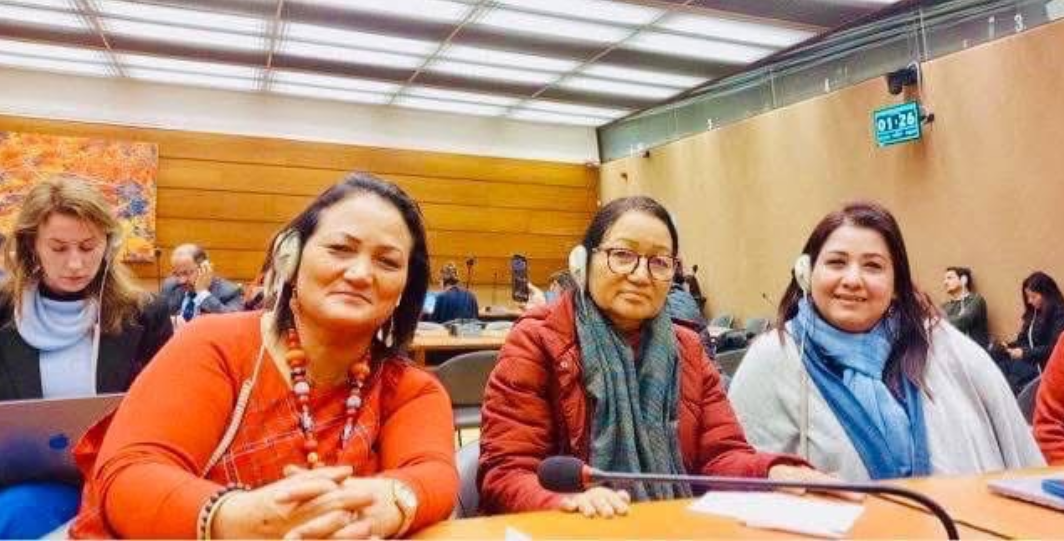
At the session, NIWF Chairperson, Ms. Suni Lama, engaged with global stakeholders, amplifying the voices of Indigenous women and advocating for urgent legal and policy reforms. She emphasized the intersectional challenges faced by Indigenous women, particularly concerning gender, disability, and feminist perspectives. By leveraging this international platform, NIWF is reinforcing its call for structural changes to uphold the rights of Indigenous women, ensuring their self-determination, access to resources, and full participation in decision-making. This initiative marks a crucial step toward achieving long-overdue justice and recognition for Indigenous Women in Nepal.
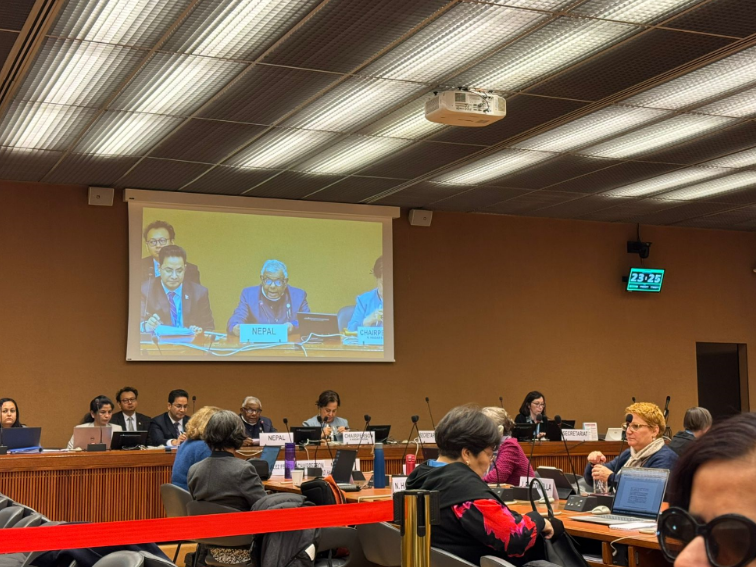
On 26th January 2025, the National Indigenous Women Forum (NIWF), with the support of FIMI, organized a sharing and consultation program to review the National Adaptation Plan (NAP) 2021–2050 from the perspective of Indigenous Peoples and Indigenous Women. The program aimed to assess the extent to which Indigenous voices have been included in Nepal’s long-term climate adaptation strategies and to gather insights for strengthening Indigenous participation in national climate policies. The event was chaired by Ms. Suni Lama, NIWF’s Chairperson, who welcomed the participants and highlighted NIWF’s continued engagement in international advocacy while emphasizing the need for concrete actions at the national level. She stressed the importance of ensuring that policies like the NAP reflect the realities and rights of Indigenous Peoples. Introducing the two key presenters, Mr. Kamal Sampang and Mr. Hom Yamphu, she acknowledged their contributions to NIWF’s advocacy for Indigenous rights. The session was moderated by Mr. Kamal Sampang, ensuring an interactive and engaging discussion.

Mr. Hom Yamphu’s presentation focused on the importance of recognizing Indigenous Peoples as rights-holders in climate adaptation processes, rather than portraying them as passive victims. He highlighted that while the NAP acknowledges Indigenous communities, it lacks mechanisms for their meaningful participation in decision-making. He also emphasized the value of Indigenous knowledge systems in climate adaptation, advocating for their integration into national policies. His presentation underscored the need for a rights-based approach where Indigenous communities are active partners in shaping climate resilience strategies.
Mr. Kamal Sampang’s presentation addressed the importance of culturally appropriate infrastructure development within the NAP framework. He pointed out that large-scale development projects often lead to land dispossession, displacement, and the loss of sacred sites, disrupting Indigenous ways of life. He also stressed the need for increased awareness about the NAP and biodiversity conservation among Indigenous communities, policymakers, and stakeholders. Additionally, he called for stronger efforts to bridge the gap between policy commitments and actual implementation, ensuring that Indigenous Peoples are not just beneficiaries but key decision-makers in climate adaptation efforts.

Following the presentations, participants engaged in an interactive discussion, sharing valuable insights and recommendations. Key suggestions included the development of clear frameworks for Indigenous participation in NAP implementation. The feedback and recommendations gathered during the consultation will be compiled into a review document by NIWF. This document will be submitted to the Ministry of Forests and Environment, advocating for the meaningful inclusion of Indigenous Peoples and Indigenous Women in Nepal’s climate adaptation policies. By facilitating this consultation, NIWF continues to strengthen Indigenous voices in national climate discussions, ensuring that their perspectives, rights, and knowledge systems are respected and integrated into Nepal’s adaptation strategies.

